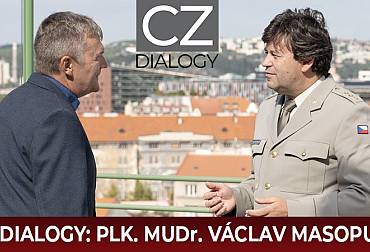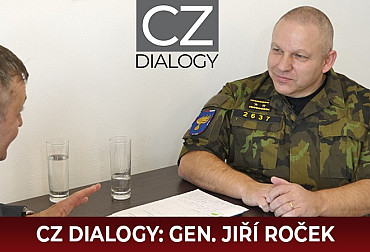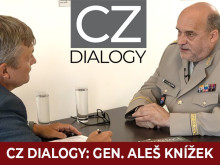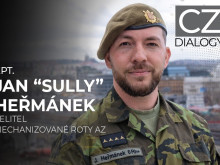Gen. Zoltán Bubeník: Every soldier must be able to provide first aid on the battlefield
A functioning military health care system is an important part of the security and combat capability of the army, which is why we invited Brigadier General Zoltán Bubeník, Director of the Military Health Care Section of the Ministry of Defence, to the next episode of our discussion programme CZ DIALOGY. Gen. Bubeník has had a rich career as a military physician, he also held the post of Chairman of the NATO COMEDS (Committee of the Chiefs of Military Medical Services) or Chief Medical Advisor to the NATO Military Committee. He has also completed missions in Kosovo and Afghanistan.
Video: Interview with Brigadier General Zoltán Bubeník, Director of the Military Healthcare Section of the Ministry of Defence / CZ DEFENCE
According to General Bubeník, military medical care is based on the so-called peacetime model, i.e. the operation of medical service centres, which carry out routine outpatient activities, take care of preventive vaccinations of soldiers and overall prevention. Of course, the system of military hospitals or the special facility for pilots, which is the Institute of Aviation Health, where specialised care, examinations and hospitalisations are dealt with and, of course, the necessary operations are performed. However, the key to proper care in the line of duty is still a well-prepared soldier, who nowadays has new tools for crucial first aid, such as stopping bleeding. According to General Bubenik, this accounts for 90% of the reasons for deaths on the battlefield. Yet the quality of this primary care, according to the General, cannot be affected by the introduction of new technologies and sensors alone; primary care still remains and will remain primary in the future. This moment has been particularly evident in foreign missions. "We have created the concept of so-called combat paramedics, which are standard soldiers who are very familiar with their weapon, their original profession, and are also trained in the algorithms of providing urgent first aid," General Bubeník specified. All the injured were treated on the spot by combat paramedics or medics. A higher level is then an own or allied field hospital. "Then comes the strategic evacuation by aircraft to the own country, where there is already a direct line between doctors and medics. On the ground, assistance is configured directly with the Central Military Hospital or another receiving hospital so that the medical staff there knows in advance in what condition the wounded soldier will be transported," the general added. There is also an exception where medical intervention occurs in-flight. The United States and the United Kingdom, for example, have such "flying operating rooms."
The big test then was COVID-19 for the Army and its medics. "At both the national and especially at the alliance level, it was a realization that was practically valid for the civilian health care components of each alliance nation, that you cannot be fully dependent on Eastern markets in terms of basic medical supplies and protective equipment," the general said. Hence the various ad hoc working groups that were formed to address the ability of the alliance states to be more self-sufficient. But the main lesson learned, according to General Bubenik, was that soldiers and the military medical service still have a say in the crisis functioning of the civilian health care system. The Army also sharpened the entire system of assistance at both the national and alliance levels. "We were taking measures at the tactical level, how to test, how to go to work, how to maintain some distance, but of course there was also coordination at the operational level. That means deploying troops to overseas operations and their primary protection against covid. Testing, vaccinations and those things. And, of course, the strategic decision-making was indicative not only of the crisis preparedness of the national health services, but also of the successful integration of civilian and military cooperation," the general recalled.
 Picture: In this episode of our discussion show CZ DIALOGY, we talked with the Director of the Military Health Section of the Ministry of Defence, Brigadier General Zoltán Bubeník | Michal Pivoňka / CZ DEFENCE
Picture: In this episode of our discussion show CZ DIALOGY, we talked with the Director of the Military Health Section of the Ministry of Defence, Brigadier General Zoltán Bubeník | Michal Pivoňka / CZ DEFENCE
Well-resourced logistics are key to the proper and timely functioning of medical assistance. And the medical service, according to Zoltán Bubeník, is cited as part of the logistics. "Logistics and medical services are part of the basic pillars of the so-called sustainability in deployment. Strict logistics principles are applied to medical supplies, blood or medicines. Acquisition of material, stacking, unstacking, use in the field, or for some equipment or technology, repairing and stacking them back and then scrapping them. This universal logistics principle is applied in a similar way to fuel or ammunition, but with the difference that medical supplies have a shorter shelf life," the general pointed out.
Military medics and doctors are not shying away from modernisation either. All modernisation projects are developed in close cooperation with the Industrial Cooperation Section with the involvement of domestic industry. "Unlike the defence industry, we are linking this with the Association of Manufacturers and Suppliers of Medical Devices so as to get as many companies as possible for our portfolio of activities that have some specific interest, whether in terms of biological protection, transport of patients under specific conditions or just the use of the devices we need for first aid in the field," General Bubenik noted. However, the other modernisation projects of the 21st century are not left aside. Within the army, this means digitalisation, for example, the use of sensors on the battlefield. This process involves not only military health units in solving the so-called field problem, but also military hospitals, the Institute of Aviation Health or the Faculty of Military Health. "The Faculty of Military Health is still such a unique project of linking military and civilian health care. Military doctors or even pharmacists and dentists are trained by the Faculty of Military Health in cooperation with the Faculty of Medicine of Charles University in Hradec Kralové. People who pass the entrance exams for the civilian faculty can decide for military service later during their studies," Bubeník said. The Faculty of Medicine in Hradec Králové has maintained a high professional level and prestige among other schools throughout its existence. Approximately 30 students out of the total number of 200 to 250 students can pass the military part of the studies every year. "If you consider that about 1,500 to 2,000 people apply to the civilian faculties, to pass through the sieve of 200 students and to be among those 30 is also a demonstration of the continuing prestige of the military faculty, where the best students apply," the general pointed out.
Active Reserves are also being used in the military health sector, for example, in the event of the need to open the military hospital in Těchonín, where 130 reservists are expected to be used. According to the general, the military medical service is perhaps a little more attractive to civilian workers, medics and doctors than other units. "In three years we have managed to get to 80% manning. In the civilian service, there are about five to 10 support medical workers, nurses, lab technicians for every one doctor. The army's ambition is to place teams formed in this way with field hospitals, with some team members even serving in staff medical roles. "An example is the director of the Prague ambulance service, Petr Kolouch, who completed a mission in Afghanistan less than two or three years ago. And now we have Active Reserves, i.e. doctors deployed in the mission in Slovakia. So combat deployment or operational deployment is no exception and the doctors and medics are interested in it," Bubeník explained.
In our interview, we also talked with General Bubeník about the assistance of the military health sector in the context of the war in Ukraine, we discussed cooperation with the Integrated Rescue System, we addressed the current state of military medical personnel or the connection of military doctors and medics with civilian employees.





















